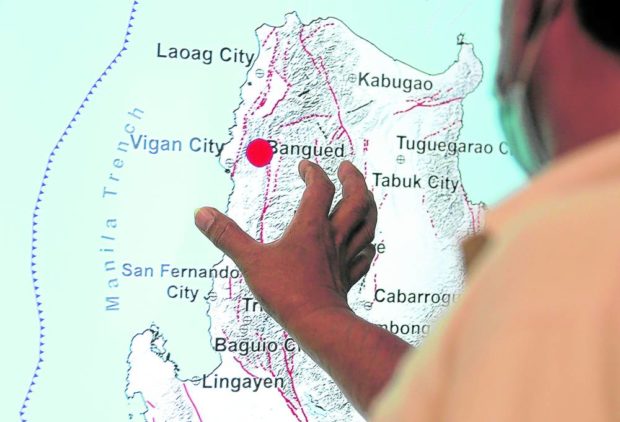Cordillera needs P6 billion for quake recovery – Neda

EPICENTER | A staff at the Philippine Institute of Volcanology and Seismology shows the epicenter of the 7-magnitude earthquake that struck Abra province, causing widespread damage to old and new homes and buildings across the Ilocos and Cordillera regions. (File photo by GRIG C. MONTEGRANDE / Philippine Daily Inquirer)
BAGUIO CITY, Benguet, Philippines — The Cordillera region would need over P6 billion to recover from the magnitude 7 earthquake that struck Luzon on July 27, and a third of the funds would be spent on rebuilding shattered homes, officials said Tuesday.
Abra province, which bore the brunt of the quake, would require P4.561 billion, while Mountain Province would get about P1.5 billion in a recovery plan, said Susan Sumbeling, the National Economic and Development Authority (Neda) director for the Cordillera.
At an online meeting of the Cordillera Disaster Risk Reduction and Management Council, Sumbeling said the recovery plan would be presented to their national counterparts to secure part of the funding.
Abra and Mountain Province incurred the most damage due to the quake, which cost Abra alone about P2.68 billion in damaged homes, infrastructure and other assets. Mountain Province pegged its losses at P559 million.
Investments of up to P2.233 billion would be directed to the housing sector, Sumbeling said.
Article continues after this advertisementAbout P332.84 million has been allocated this year for public infrastructure repairs, while another P1.3 billion will have to be raised for 2023 to complete the total of P1.633 billion required to rebuild and upgrade roads throughout the mountain region.
Article continues after this advertisementFood production could recover using P474 million allocated this year and another P35.59 million for 2023, totaling P510 million in recovery appropriations.
Impact
This year’s earthquake, the strongest to have hit the region since 1990, affected 114,389 families (410,416 people) in 601 barangays and killed 10 and injured 534 people. The tremor destroyed 781 houses and damaged 27,626 others.
The earthquake may have weakened more mountain areas, said Jeffrey Perez, a geologist for the Philippine Institute of Volcanology and Seismology (Phivolcs).
Perez discussed the impact of the recent and future tremors during the National Science and Technology Week held in La Trinidad, Benguet, on Sept. 20.
Citing an inventory of quake-induced erosion, a Phivolcs team recommended the relocation of some households at Barangay Lipcan in Abra’s Bangued town, Barangay Tangadan in San Quintin town; and sitios Nagdaingan, Cautit and Tambor in Pidigan town, he said.
Also recommended for relocation were areas in the villages of Matibuey and Tiagan in San Emilio town, Ilocos Sur; Sacasacan village in Sadanga town, Mountain Province; and Uma village in Lubuagan town; Guinaang village in Pasil town; and Apatan village in Pinukpuk town, all in Kalinga province.
Data gathering
At the same event, the Department of Science and Technology launched two projects it undertook with Baguio universities to gather more data about landslides among mountain settlements.
The University of the Cordilleras (UC) will measure landslide events in Baguio City and its neighboring Benguet towns of La Trinidad, Itogon, Sablan, Tuba and Tublay using ground sensors and mathematical and engineering models.
Nathaniel Vincent Lubrica, project leader and UC director of research and innovation, said these projects would help local governments respond faster once potential erosion is detected.
Part of these studies intends to understand indigenous practices in the Cordillera that helped older generations address erosion, said University of the Philippines Baguio math professor Wilfredo Alangui, one of the project leaders tasked with putting up a Landslide Knowledge and Management Center.
—VINCENT CABREZA
RELATED STORIES
In Cordillera, DOH seeks urgent repair of quake-damaged health facilities
Cordillera reels from rising inflation
Over 500K affected by Abra earthquake; damage to infrastructure at P1.5B